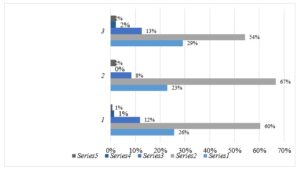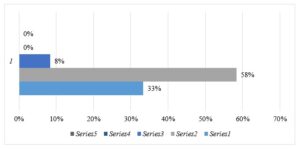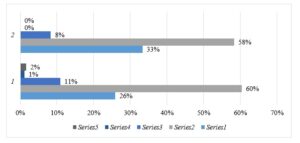Introduction
In the world today, faced with pandemic contexts resulting from SARS-CoV-2, the pharmaceutical sector has been in a complex and dynamic environment, bringing with it internal adaptation, which involves guaranteeing the timely and appropriate distribution of medicines, contingency plans for drug stocks, and the use of information technologies. These aspects allow for differentiation and immediate responses in a context that is not very predictable (Cabañas y Queralt, 2020, pp.53-56). The high demand for pharmaceutical products, due to this situation, has generated problems of shortages. This fact has led to the need to guarantee efficiency and effectiveness in the supply of products (Climent and Selva, 2020, pp.21-23). To achieve competitiveness and differentiation, companies in the pharmaceutical sector require large investments in research and development and their logistics processes (Escandón et al., 2016, pp.39-46).
It is worth noting the importance of logistics management in this area, for decision-making related to drug procurement procedures and stock management. Thus, according to the World Bank (2016), Germany, the Netherlands, and Singapore are three significant leaders in logistics management due to the continuous development and boost in innovation for competitiveness. Additionally, in Portugal, thanks to innovation, pharmacies have implemented automated systems for the distribution of products from their warehouse directly to the customer, allowing personalized attention. In this sense, Europe stands out as the continent with the most outstanding companies regarding logistics efficiency (Caetano Da Rosa, Au Yong, and Branco, 2018, pp.1-6).
On the other hand, in South America, Chile is considered a benchmark in the performance of international cargo and transportation, which are key aspects of economic competitiveness. In this sense, corporations that do not have efficient logistics management are at risk of being uncompetitive (World Bank, 2012).
In Peru, the pharmaceutical sector has shown annual growth of more than 10% in drug sales since 2001, and a 15% increase is forecast. It is also estimated that there is an unsatisfied demand, which indicates the need to improve standards in logistics processes (Vásquez, 2015). In the consolidated pharmaceutical industry, new techniques have been implemented to maintain a level of products according to demand and low costs. However, small and medium-sized drugstores and pharmacies continue to perform their logistics processes empirically and one of the main problems in these establishments is the inadequate planning in the procurement process. Thus, problems arise in the placing of orders, the inadequate reception, storage, and dispatch of products, causing losses. As a result, these companies fail to succeed (Mantari and Quispe, 2019, pp.4-14).
Competitiveness is the capacity of economic agents to remain in the market. Regarding the level of competitiveness, Peru is rated at 4.80 points out of 10 (optimum level), because only 30% of Peruvian companies have competitive supply chains, while 10% of local organizations are in the learning process; 35% are primary, i. e., companies with low levels of automation and reduced efficiency in supply chain management; and, finally, 25% are the pragmatists (those that despite having low levels of automation manage to be effective in the management of their supply chain) (Peralta, 2015, 4-6). Therefore, the importance of logistics management is improving and has a long way to go.
Thus, planning the production process allows companies to improve their readiness and agility to face market turbulences (Castillo and Meléndez, 2021, p.25).
In Cajamarca’s pharmaceutical sector, difficulties have been reported concerning supply and stocks available to meet customers’ medicine requirements, due to the lack of knowledge and poor planning in these areas. However, due to the presence of large pharmaceutical companies, small and medium-sized companies need to adopt measures for logistics management. Otherwise, they will be replaced by the competition. The importance of logistics management lies in cost reduction and profit maximization, which allows being competitive in the market (Leiva and Marín, 2017, p.42).
Over time, people have carried out certain logistics activities, and their evolution has allowed organizations to consecutively deal with the processes of logistics management. Logistics management takes over supply chain management and proceeds to control, efficiently but also effectively, the flow and storage of goods and services, as well as related information, from the point of origin to the point of consumption, with the purpose of satisfying customers (Carro and Gonzalez, 2013, p.16).
Next, in the logistics field, advances have caused logistics operations to adapt to the needs presented by society and the pace of commercial transactions necessary to meet consumer demand (Escobar, 2010 cited in Fontalvo, De la Hoz, and Mendoza, 2019).
Competitiveness emerged in organizations where it is chained to their ability to hold a steady increase concerning the capacity to design, produce and commercialize goods and services equally or more effectively and efficiently than their competitors (Enright et al., 1994 cited in Cabezas, 2017). Its purpose is to achieve that the company reaches a profitable and sustainable position taking into account the forces that govern industry competition (Porter, 1991 cited in Porter 2015).
Currently, logistics management and corporate competitiveness are strongly relevant in the business environment, since they drive the growth and development of organizations to improve their profitability and permanence in the market. Likewise, they have an impact on the decrease of logistics costs, which allows the adaptation of processes through technological advances, excluding repetitive methods significantly heading towards competitiveness (Faichin, 2018, pp.20-29). Therefore, the company’s capacity to produce and commercialize in better cost and quality contexts for customers is important.
Among the dimensions used to measure Logistics Management are: I) Logistics strategy: it is one of the fundamental bases in the global approach of the company since it adopts an orientation about adding value to the customer in the market regarding logistics decision-making. II) Logistica coordination effectiveness: it generates better work practices among the company’s areas and training with strategic projection. III) Commitment to customer service: it is one of the multifunctional attributes of logistics management, which adds value to the customer and must be intrinsically immersed in the overall business strategy (Spillan, Mintu, and Kara, 2018).
On the other hand, the dimension used for Corporate Competitiveness is Division Competitiveness: it is the effective responsiveness in terms of needs and offers compared to competitors of products and services. This dimension arises as a systematic response from generating strategies. It also aims to achieve a rapid response effect on the different stakeholders of the company, such as competitors, suppliers, and customers (Murillo, 2018).
Materials And Methods
Results

Fig. 1. Logistics Management and its dimensions
Source: own research of autor
Fig. 1, regarding the Logistics Management variable, shows that the “Logistics coordination effectiveness” dimension was the best rated with a value of 66.67%, in the “Agree” opinion.
Fig. 2. Corporate Competitiveness and its dimensions
Source: own research of autor
Fig. 2, regarding the Corporate Competitiveness variable, shows that the “Division Competitiveness” dimension has been rated with a value of 58.33%, indicating that the collaborators of Boticas Marifarma “Agree”.

Fig. 3. Overall rating of the variables “Logistics Management” and “Corporate Competitiveness
Source: own research of author
Fig. 3, shows that the variables with an overall rating of “Agree” are: Logistics Management with 60.42% and Corporate Competitiveness with 58.33%.
Table 1. Hypothesis test of the Logistics Management and Corporate
Competitiveness of Boticas Marifama

Source: own research of author
In Table 1, the Pearson test shows that there is a correlation between the variables, with a significance of 0.021, which is lower than 0.05. Therefore, the research hypothesis is accepted. The correlation coefficient is equal to 0.572, so, it is determined that there is a direct and moderate relationship between Logistics Management and Corporate Competitiveness in Boticas Marifarma, in the city of Cajamarca, 2021. This indicates that the greater the Logistics Management, the greater the Corporate Competitiveness.
Discussion
After obtaining the results and testing the hypotheses, it was found that the variables worked in the same line, whose findings indicate a correlation between logistics management and corporate competitiveness.
According to Palomar and Alvares (2020), it is essential to establish the necessary measures within the logistics process to efficiently guarantee the availability of medicines for customers, so as to increase competitiveness compared to other pharmacies and drugstores that are part of the industry, resulting in an approach to logistics processes. Therefore, these results are consistent with the findings of this research.
Espiritu and Ponce (2015) found that the impact of inventory logistics is highly relevant for sales, and, therefore, enables the company’s competitiveness. Inadequate logistics management affects sales and competitiveness. Likewise, this study agrees with the findings, since poorly applied logistics do not increase corporate competitiveness.
Bravo and Morales (2021) indicate that inventory management in logistics allows for an increase in sales levels, as well as the growth in the market, achieving the organization’s goals regarding the products entering the warehouse and their availability to customers. These conclusions are related to the study carried out, since there is a relationship between the variables.
It is also proven by the statements of the World Bank (2012) which indicated that corporations that have efficient logistics management can be more competitive. In this study, it was found that the better the logistics management, the more competitive the companies.
Conclusions
The research concludes that 60.42% of the respondents “Agree” with Logistics Management and its importance in the production process. On the other hand, 58.33% “Agree” that Corporate Competitiveness is essential for the company to have continuity in the market. In addition, with the general hypothesis test, it is determined that there is a direct and moderate relationship between the variables, Logistics Management and Corporate Competitiveness, with a correlation coefficient of 0.572.
In turn, the specific hypothesis test determines the relationship between Logistics Management and the Division Competitiveness dimension, where it was obtained that the correlation coefficient is 0.572, demonstrating the direct and moderate relationship between Logistics Management and the Division Competitiveness dimension.
The research has shown theoretical consistency, finding a correlation between both variables. Therefore, it is concluded that Logistics Management has been applied over time in business, being important in the production process of goods and services, related to the company’s capacity to produce and commercialize in better cost and quality contexts for customers, which raises the Corporate Competitiveness in the market.
Acknowledgment
We thank the people who helped us professionally, guiding us on the right path, being the support and strength in those good and bad moments. We would also like to acknowledge the Universidad Privada del Norte, the entire Business School, and our professors, who taught us with their valuable knowledge and gave us their help to carry out this research work. At the same time, special thanks to Boticas Marifarma for allowing us to access the information and the commitment provided.
References
- World Bank (2012). El desempeño a nivel mundial de la logística comercial disminuyó en medio de la recesión y de acontecimientos importantes. https://www.bancomundial.org/es/news/press-release/2012/05/15/global-trade-logistics-performance-slows-down-amid-recession-and-major-events
- World Bank (2016). International LPI. https://lpi.worldbank.org/international/global/2016
- Bravo Nazar, S., and Morales Peralta, M.A. (2021). “Mejora de la gestión de inventario y almacén de la farmacia Nimadi E.I.R.L. para reducir los costos logísticos” [Undergraduate thesis, Universidad Privada del Norte]. UPN Repository. https://repositorio.upn.edu.pe/bitstream/handle/11537/26991/Bravo%20Nazar%2c%20Susy%20-%20Morales%20Peralta%2c%20Manuel%20Augusto.pdf?sequence=1yisAllowed=y
- Cabañas, M. J., and Queralt Gorgas, M. (2020). El farmacéutico frente a la logística de dispensación, almacenamiento y conservación segura de medicamentos en unidades asistenciales. Farmacia hospitalaria: órgano oficial de expresión científica de la Sociedad Española de Farmacia Hospitalaria, 44(7), 53-56. Scopus. https://doi.org/10.7399/fh.11495
- Cabezas Arboleda, M.A. (2017). “Factores críticos para la competitividad colombiana: desde la cara de la competitividad sistemática”. [Thesis, Universidad del Rosario]. https://repository.urosario.edu.co/bitstream/handle/10336/14438/CabezasArboleda-MariaAlejandra-2017.pdf?sequence=1
- Caetano da Rosa, R, Au-Yong-Oliveira, M., Goncalves, R., and Branco, F. (2018). “Un estudio de caso en el sector farmacéutico en Portugal La implementación de un sistema automatizado en Farmacia Giro para aumentar la competitividad”. 13th Iberian Conference on Information Systems and Technologies (CISTI), pp. 1-6. Doi: 10.23919/CISTI.2018.8399190
- Carro, R. and González Gómez, A. (2013). Logística empresarial. Universidad Nacional de Mar del Plata. http://nulan.mdp.edu.ar/id/eprint/1831
- Castillo, A. M., and Melendez, N. E. (2021). Propuesta de mejora en gestión de producción y logística según teorías del SRM, CRM, MRP, para incrementar la rentabilidad de fábrica D’Cueros S. A. C. Trujillo, 2020. https://doi.org/10.18687/LACCEI2021.1.1.42
- Climent-Ballester, S. and Selva-Otaolaurruchi J. (2020). Farmacia Hospitalaria: Gestión integral de dispositivos médicos durante el SARS- CoV-2. Farmacia hospitalaria: órgano oficial de expresión científica de la Sociedad Española de Farmacia Hospitalaria,44(7),21-23. https://doi.org/10.7399/fh.11486
- Escandón Barbosa, D. M., Hurtado Ayala, A., and Arias Sandoval, A. (2016). The Colombian pharmaceutical industry: Factors affecting export. European Journal of Management and Business Economics, 25(2), 39-46. https://doi.org/10.1016/j.redee.2015.10.004
- Espíritu Roque, A. Ponce Morales, S. (2015). “Logística de inventarios y su incidencia en las ventas de la Botica “24 Horas” de la provincia de Ambo- 2013” [Undergraduate thesis, Universidad Nacional Hermilio Valdizán Huánuco]. UNHEVAL-Institucional. https://alicia.concytec.gob.pe/vufind/Record/UNHE_d8a8e21e04b2a0a35c4db8588835a2c9
- Fontalvo-Herrera, T., De-la-Hoz-Granadillo, E., & Mendoza-Mendoza, A. (2019). Los procesos Logísticos y la administración de la cadena de suministro. Saber, Ciencia Y Libertad, 14(2), 102–112. https://doi.org/10.18041/2382-3240/saber.2019v14n2.5880
- Hernández, R., Fernández, C., and Baptista, M. (2018). Metodología de la Investigación. Mc Graw Hill. https://www.uca.ac.cr/wp-content/uploads/2017/10/Investigacion.pdf
- Navarrete Gómez, R. (2014). Logística y aprovisionamiento para una red de farmacia [Undergraduate thesis, Universidad de Guayaquil]. UG Repository http://repositorio.ug.edu.ec/handle/redug/4572
- Leiva, A, and Marín, V.M. (2016). “Influencia de la gestión logística en la rentabilidad de la empresa productora de hortalizas y legumbres flores andinas S.R.L en los periodos 2014-2015 en la ciudad de Cajamarca” [Undergraduate thesis, Universidad Privada Antenor Guillermo Urrelo]. UPAGU Repository http://repositorio.upagu.edu.pe/bitstream/handle/UPAGU/541/Cont0044.pdf?sequence=1yisAllowed=y
- Mantari Sairitupac, D. and Quispe Huacasi, M. P. (2019). “Propuesta de mejora del proceso logístico de productos farmacéuticos en empresa Santa Úrsula Servicios de Salud E.I.R.L.”. Universidad Tecnológica del Perú. https://repositorio.utp.edu.pe/bitstream/handle/20.500.12867/2848/Delia%20Mantari_Milagros%20Quispe_Tesis_Titulo%20Profesional_2019.pdf?sequence=1yisAllowed=y
- Murillo, K. (2018). La gestión logística y la competitividad de la división en empresas de la provincia de Tungurahua [Undergraduate thesis, Universidad Técnica de Ambato]. UTA Repository. https://repositorio.uta.edu.ec/bitstream/123456789/32118/1/10%20ADE.pdf
- Ocampos Véles, P.C., and Rodrigues, L. (2016). Estrategias de mejoramiento de la logística de cadena de frio, para productos farmaceuticos. Contexto. (5), 105-114. https://doi.org/10.18634/ctxj.5v.0i.654
- Palomar-Fernández, C., & Álvarez-Díaz, A. (2020). El servicio de farmacia frente a la logística de adquisición de medicamentos. Órgano oficial de expresión científica de la Sociedad Española de Farmacia Hospitalaria. 1 (44), 17-20. ScienceDirect. https://doi.org/10.7399/fh.11489
- Peralta, Norka (2015). Cuarto estudio sobre la situación del Supply Chain Management en el Perú. Semana Económica, 28. https://gs1pe.org/pdf_gs1pe/04_cuarto_estudio_SC_Peru_gs1pe_web.pdf
- Porter, M. E., (2015). Ventaja Competitiva: Creación y sostenimiento de un desempeño superior. https://books.google.com.pe/books?id=wV4JDAAAQBAJyprintsec=frontcoverysource=gbs_ge_summary_rycad=0#v=onepageyqyf=false






